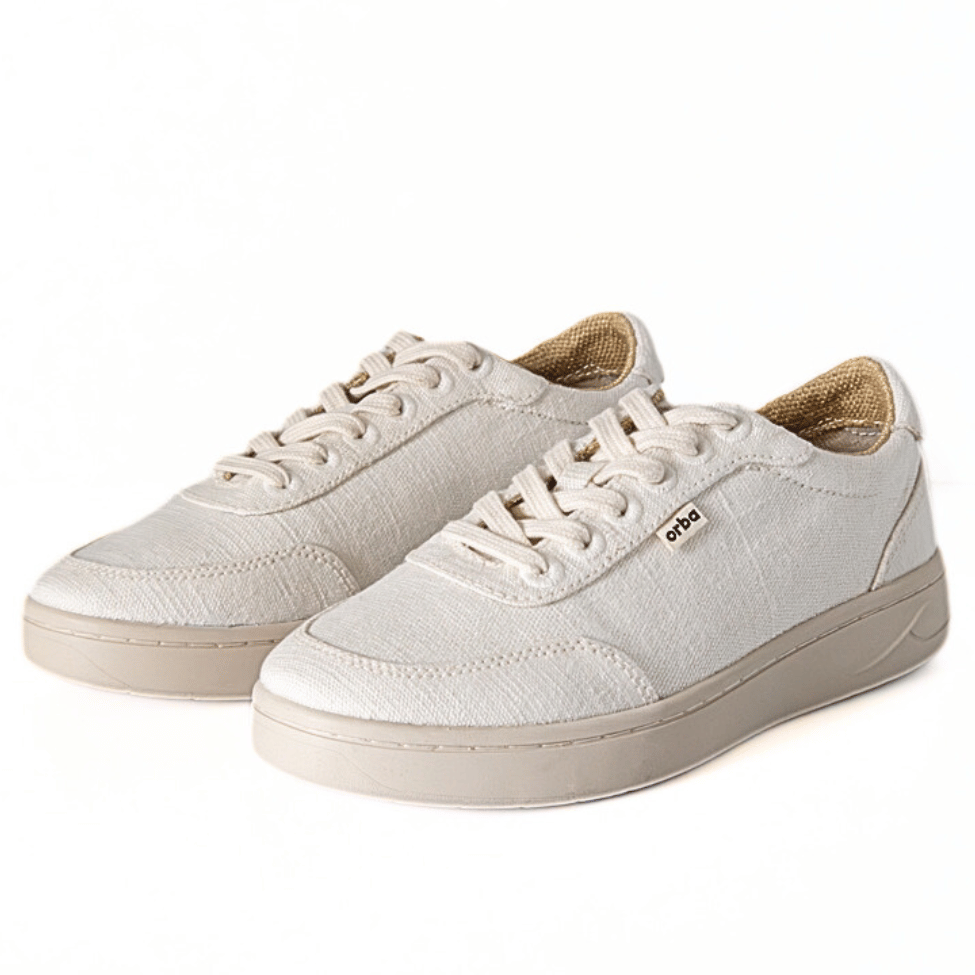Meet the team.
A New Zealand start-up with a focus on sustainability, Orba has developed a world-first stylish street sneaker that is made from nature. Designed in New Zealand, Orba shoes are handcrafted using the finest, most renewable plant-based materials in the world. A true global effort in closing the loop in footwear, Orba supports ethical sourcing and manufacturing to ensure sustainable growth in the communities they work with. A design revolution that focuses on reducing landfill, one pair of shoes at a time.
-

Gillian Boucher
Company Spokesperson, Sustainability Manager
My commitment to international development and taking action to help solve problems related to waste and pollution followed a life-changing visit to one of the largest open refuse sites in the Philippines, “Smokey Mountain,” in the slum district of Tondo, Manila.
About 10,000 people lived at the Smokey Mountain dumpsite, with many deaths and illnesses caused by the poisonous atmosphere and spontaneous combustion of flammable substances from some 2 million tonnes of decomposing waste.
As a professional musician, I was invited to the Philippines, in 2007, to perform for an event held by the Christian Philippine Foundation (CPH) to raise funds to build a new school in the Tondo district, one of the poorest and most underdeveloped places in the country.
While there we were offered to visit the existing school and the 30-minute drive to Tondo put me in another world – slums full of poverty and despair. The heat and humidity were unbearable. Our school visit was cancelled due to flooding with the flood water considered contaminated full of toxic waste from the surrounding streets. We walked to the dumpsite. Amidst the toxic haze and hazardous landscape were shanties full of thousands of families with children walking bare foot in piles of garbage that included abattoir and hospital waste. What struck me the most was that number of children working. I was told they could earn 25 cents for every kilo of plastic they collected.
Feeling overwhelmed by the experience, a year later, I enrolled in a BSc degree in International Development with the London School of Economics and upon completion of that, I did my MSc in Sustainable Development. If it weren’t for my music, I would never have ended up in Tondo; if it weren’t for Tondo, I wouldn’t have developed the desire to address waste, pollution and development in the world and promote social and economic empowerment.
When the opportunity arose to co-found a project that could address the huge impact of waste in the footwear industry and work with small, traditional suppliers of textiles in Bali, it was a no-brainer. I’m a firm believer that everything happens for a reason.
-

Marshall Westlake
Development & Production Controller
We launched the Orba Ghost casual sneaker, in my 59 th year in the footwear industry, after almost 5 years of steady research and development. I see this as a product that had to happen if the planet is going to avoid choking on plastic and related poisons.
Most products were wrapped in banana leaf packaging when I became involved in the Indonesian footwear industry in 1991. People were in the habit of throwing their discarded leaf into the garden and it would degrade in days.
Plastic packaging became available, and people treated plastics in the same way, but the plastic never disappears. In Java, the pollution had to be seen to be believed. And Java had become the world’s sixth largest footwear producer. There were 120 million people able to throw 2 or more pairs of sandals away every year - the products I was responsible for making. I needed to be part of finding a solution.
So, a small team of us set about developing a shoe that can be made so that once it’s thrown away it will disappear without polluting landfill. It has taken five years to find the right combination of renewable materials, to find processes that work in mass production, and to build a business that not only helps the environment but helps the people involved in creating these products as well. It is a very interesting project, and I’m proud of what we’ve been able to achieve.
Now it’s about educating the industry and proving to consumers that chemicals & plastic pollutants are not necessary to make great footwear.
The world was less populated when I began as an apprentice engineer in 1963 at Clarkes in the UK. The culture was to make our product at a fair profit, but we did not give much thought to the other impacts. Now, those impacts are there for all to see. I believe we can save the world from plastic pollution. It’s very important to me that I do my little bit to help.






